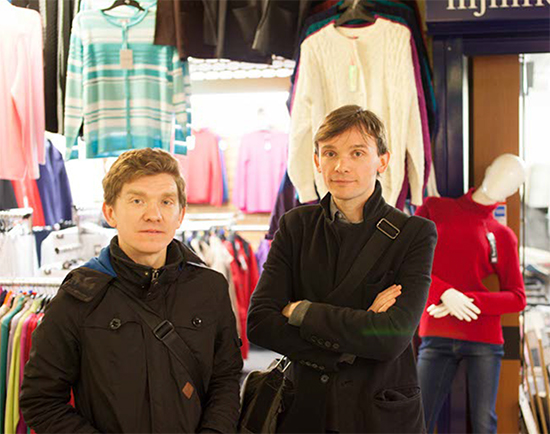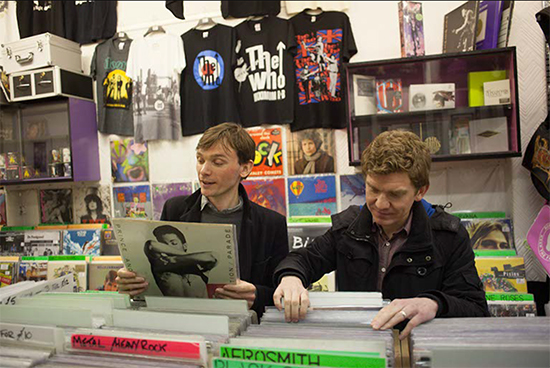Photographs courtesy of Andy Martin
They did warn me. My request to be “shown the sights of Sunderland” was met with a degree of incredulity by David Brewis, when I suggested a location for our interview about Field Music’s glorious new album, Commontime. Indeed, on arrival, it would appear that the weather gods are in a conspiratorial mood as rain lashes down on a freezing January morning.
However, both David and his brother Peter are consummate hosts and implicitly understand that the way to a man’s heart is via his love of falafel. Having met at Field Music’s recording studio-cum-rehearsal space, which looks out over boats bobbing on the River Wear (okay, I may be over-romanticising that particular image), we head into town and to David’s favourite vegan café in Sunderland. Which happens to be the only vegan café in Sunderland.
Over some wondrous falafel, we discuss – in great depth, such is our mutual love of Prince – recent events in which Prince seemingly tweeted a link to Field Music’s single, ‘The Noisy Days Are Over’. From there we spend a few minutes browsing in the excellent Hot Rats record shop (as featured in the video for the single), before heading over to Jacky Whites market. It’s a place seemingly entombed in 1975, and one where you can buy absolutely anything.
Finally, to seal the deal on Sunderland being my new favourite place, we bag a seat in Louis’ Café for a steaming mug of tea and one of their legendary scones – and begin to talk about the making of Commontime. The album is Field Music’s first since 2012’s Mercury-nominated Plumb – aside from last year’s Music For Drifters soundtrack, David’s 2014 School Of Language album and a number of collaborative projects with the likes of Slug and Maximo Park’s Paul Smith. The Brewis brothers are never idle.
Commontime is also, perhaps critically, the first Field Music album since both men became fathers. Fatherhood shapes Commontime – it’s easily the most accessible Field Music album to date, adding a pop sensibility to their intricate prog-funk, and partly inspired by Peter’s young son’s love of "Hall & Oates and American number one singles." Peter’s lullaby to his son, ‘The Morning Is Waiting For You’, is possibly Field Music’s most beautiful song to date.
Not that parenthood has softened the Brewis brothers’ outlook. While their Sunderland roots are deep (the band have consistently resisted temptation to decamp towards brighter lights), it is a town that bears the brunt of government policy and the grinding monotony of job losses and budget cuts. Commontime has moments of gentle rage (most notably on ‘Trouble At The Lights’), but the overwhelming sense is that the very creation of such a joyous record is an act of political defiance. Field Music are in a good place.
Let’s talk about the most important topic first. Tell me the story about Prince, Twitter and Field Music.
David Brewis: I have a search for ‘Field Music’ in case there is anything I need to respond to and a tweet came up from ‘@Prince3EG’ that said ‘FIELD’ and ‘MUSIC’ and a link to our song [‘The Noisy Day Are Over’]. It didn’t say anything else. I looked at the rest of his Twitter feed and it seemed like it could have actually been Prince. It didn’t seem like a cleverly mediated promotional site. It really seemed like it was him. So, I think he has heard the song. Does that mean he liked it? Or, does he think we’ve steered too close to recycling his ideas? There is a touch of homage to that song, admittedly.
Then he deleted the tweet. Did that mean he hated the song? Was he just trying to baffle everyone? Then, I was asked to write an article about why Field Music like Prince and he tweeted a link to that article as well. That was particularly strange because I was up late on a Sunday night writing about how much I like Prince and within 24 hours he had read the article – and not been offended by it.
How did the Prince/Twitter episode make you feel?
DB: It made me very happy and very confused.
Why confused?
DB: I just cannot imagine Prince sitting at home and listening to Field Music.
I disagree – I reckon Field Music are a favourite in the Rogers Nelson household. Anyway, enough of this speculation, turning to Commontime, there are a number of tracks that feel as if they were cut from the same cloth as the last School Of Language album. Would you agree?
DB: Absolutely. It one of the reasons why we called the School Of Language record a ‘Field Music production’, because it all feeds into this linear – if not a straight line – vision of what we are doing. I haven’t stopped wanting to make that wiry pop funk. It’s still there every time I pick up the guitar to write new music. There is no way I could blank all of that stuff out, because what I was doing on the School Of Language record was exactly the music I wanted to make at the time.

How do you decide how a new Field Music album might sound?
DB: Peter and I talk about music and play each other albums – usually in the van together – and this time round we were probably talking about things Peter’s son really likes. We were listening to loads of Hall & Oates and obsessing about how great we thought the backing vocals were on those records – and thinking that we could do something like that. At the same time, that only works if what you write lends itself to what you have been discussing. I couldn’t sit down and decide I was going to write a pop song influenced by A, B and C. It never works like that for me. Maybe we turned down the inhibitions for this record and all the weird rules that we have were relaxed a bit.
Why were the weird rules relaxed for this album?
DB: Why? To do something different and because we had been listening to loads of pop music. There was a definitely a sense of wanting to have some fun. We both look after our kids and having three days per week in the studio was our time off and fun time. We did more singing together and wanted more spontaneity. In the past we may have rejected an idea for being too obvious, this time we just went with it – and played that chorus again and played that riff again.
I have to say that Commontime may well end up being my favourite album of yours. This seems to be your most ‘pop’ album to date and it appeals to my little ‘pop brain’.
Peter Brewis: It was written for my son’s little ‘pop brain’ as well. That’s what he likes and, I have to say, that’s what I like. I like the idea of being repetitious without being formulaic. However, the thing with Field Music when we first started the concept in our mind was that we didn’t want to repeat anything. With this album, it was different. I remember when my wife and I were on a car journey listening to ‘Young Americans’. My son was in the backseat. He was about 18 months old and made us listen to the song about 20 times in a row. So, I had to keep listening to it and I had to find the things in the song that I hadn’t previously noticed. After four listens, I was really bored, but after 15 listens I could have listened another 15 times.
DB: Unfortunately for me, my son is going through his ‘Yellow Submarine’ phase. Just the song. I could live with hating that song for the next ten years.
Is this, therefore, the most accessible Field Music album to date?
DB: I am okay with the word ‘accessible’. The first single [‘The Noisy Day Are Over’] has done really well. People seem to like it, but it still has a bizarre, atonal saxophone solo and it is six-and-a-half minutes long. So, that’s accessible by our standards. In addition, the other thing we are still asking people with this record is to question the idea of what is cool. If you hear a song like [Hall & Oates] ‘Kiss On My List’ and think “not cool,” you should chuck out all your preconceptions about what it is to be cool. Although, admittedly, me going to school in a corduroy jacket and flared jeans was never going to be cool. Now I just look like my history teacher.
PB: We also bought a really unfashionable, early 80s keyboard that was barely used on any songs at the time. It’s an electronic piano that you might hear on Tusk or a Hall & Oates track – a Yamaha CP30. We ended up splashing that on loads of the new songs, because it is a really esoteric sound. Some might say it is a naff sound. That became a challenge and became another fun aspect.
You have mentioned the impact of your son liking pop songs, and it feels that much of Commontime is inspired by fatherhood. As new dads, just how much has your perspective changed with regards to the music that you make?
PB: Hugely. Fatherhood is a massive part of that change in perspective. Our time in the studio is so finite now. We used to be able to mess around for ages, drink cups of coffee and try things between popping to the shops. Now, it’s about getting in and really having fun for three hours. After that, it’s about going home, washing dishes and making meals. Our wives have proper jobs and we do at least an equal amount of childcare.
There are specific songs about parenthood on the album – I’m thinking of [Peter’s ballad] ‘The Morning Is Waiting For You’ and [David’s] ‘Stay Awake’. Was it difficult to write those songs?
PB: No, it was just what I was thinking about at the time. I was thinking about the feelings associated with being a new father. I didn’t find that song very hard to write. The song is taken from a line from one of my son’s books, which I still read to him every single night. There is a line in it that says, “The morning is waiting for you.” I thought that was a really nice sentiment.
What do your wives think of those particular songs?
DB: It must be weird for both of our wives to have to listen to songs about them. I was a bit worried about showing Laura ‘Stay Awake’, because she would know what it was all about, but I think she might have even shed a tear when she first heard it.
PB: My son didn’t like ‘The Morning Is Waiting For You’. He was only two. He wanted ‘Another One Bites The Dust’ on again.

Some of the other tracks seem to explore the current political environment. I am thinking of ‘Trouble At The Lights’ as the most obvious example.
PB: ‘Trouble At The Lights’ is mainly about my dislike of Range Rovers and the political class of people who seem to drive them. Cars are a big status symbol and a Range Rover is a really ostentatious symbol. A Range Rover says ‘Tory’ to me. It could be anything really, but I have a particular bee in my bonnet about Range Rovers.
You do realise that you have probably just done yourself out of a sponsorship with Range Rover?
PB: Good, I don’t want one.
DB: We would gladly do another advert for Ford, though. That paid for our third album.
You both still live in Sunderland and this part of the country seems to take the full force of government policy. How much does that play into the art you make?
DB: Part of our music always has a political bent to it, but I think our personal circumstances over the last couple of years have played against that. Being a new dad means that the family becomes that much more important and much more immediate. Also, right now, the prospect of any real political change seems a long way away – so that the anger feels almost pointless. Or, at least disappointingly directionless. We are lucky – in a way – that we haven’t been spending that much time thinking about the political situation, as we’d just be permanently gutted.
As a reaction to the situation, is there a sense of ‘cocooning’ yourself in the studio and ensuring you enjoy making music?
PB: The solution to these problems is not to ignore them and have a good time. We are not doing that – but we don’t want to make really, really serious music. It’s not escapism, as the lyrics to the songs don’t always fit with the feel of the music. When we performed the songs, it was cathartic not in an angry way, but more about having a good time while we were singing these lyrics about quite difficult things.
DB: I feel that when we make our most poppy music, it’s music by kind of normal people living kind of normal lives and having kind of normal feelings. We certainly don’t make escapist music. We have always tried to make something that reflects the complexity of normality and that’s a political point worth making. Also, we live in a place where independently making something creative, which could be interpreted as art, is a political statement in itself.
PB: It is also a political action to go and have fun, despite what is going on. It’s almost like turning the other cheek.
Finally, now that you have kids, how does that effect your touring schedule?
DB: We are doing a proper Dad’s UK tour – four weekends in a row. The US tour will be very tricky. I don’t want to be away from my best little mate for 12 days.
Commontime is out on Friday (February 5) via Memphis Industries. Field Music play live across the UK during February and March


